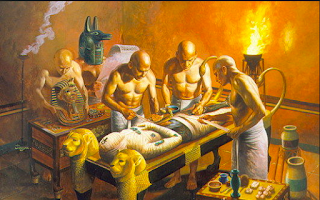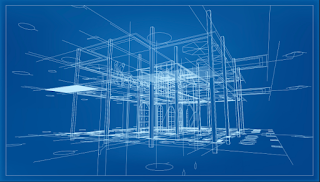Week 4: Art, Science, and Technology
Throughout history, humans have been fascinated with the human body, and what is inside of it. Ancient Greeks and Egyptians used to dissect human bodies after the passing, and use them as art. The Greeks used their findings to create anatomy, while the Egyptians took pride in taking their time to mummify the body of the dead.
(Courtesy of: Science Photo Library)
(Courtesy of: Dissection of a cadaver, 15th century painting)
This fascination had lasted all the way up to present day. Now we have exhibits like Body Worlds, that take parts of donated bodies, and put them on display for people to see. This crossover between art, medicine and technology has allowed many scientist to discover fascinating things about the human body, ,and to therefore turn around and create inventions that go along with their findings. For example, in Diane Gromala’s TED talk, she talks about her artistic inventions that interact with the human body. She created a meat book, like is made out of human muscle. If you are approach the book with anxious force, the muscles will tense up. If you are touching the book with a sense of calmness, the muscles will move in a calmer manner. She also invented a script that reads differently depending on your breathing. When you inhale, the font gets bigger, and as you exhale, it gets smaller.
(Courtesy of: http://www.bodyworlds.com/en.html)
Through different technological inventions, we have been able to learn more about the human body over the years. In contrast to the ancient belief of “using technology to help patients means you are not a real doctor”, doctors have been able to find out so much more causes and cures for diseases and illness’s Victoria Vesna argues that we are almost getting too comfortable with them. X-rays, MRI’s and Ct scans allow doctors to catch things way before the become a problem, and help us maintain a healthy and normal body. Current technology allows us to see what inside of the human body without actually having to open it up. But as we have seen above, there are advantages to both sides. Opening up dead bodies can be educational and fascinating, using tools like an arthroscope can help people fix what is wrong within their body, and have a speedy recovery.
(Courtesy of: Diane Gromala: “Meatbook”)
TEDxTalks. "TEDx Talks." YouTube. YouTube, n.d. Web. 17 Apr. 2017.
Uconlineprogram. "Body Medicine Intro." YouTube. YouTube, 26 Mar. 2012. Web. 24 Apr. 2016. <https://www.youtube.com/watch?v=zEgn-fZQ8po>
Uconlineprogram. "Medicine Pt1." YouTube. YouTube, 21 Apr. 2012. Web. 24 Apr. 2016. <https://www.youtube.com/watch?v=Ep0M2bOM9Tk>.
Uconlineprogram. "Medicine Pt2." YouTube. YouTube, 21 Apr. 2012. Web. 24 Apr. 2016. <https://www.youtube.com/watch?v=psjnQarHOqQ>.
Uconlineprogram. "Medicine Pt3." YouTube. YouTube, 22 Apr. 2012. Web. 24 Apr. 2016. <https://www.youtube.com/watch?v=FIX-9mXd3Y4>.







I agree that human body remains fascinating throughout the human history. Eventually, it has led to technical innovations as you have suggested above. Not only observation of internal human body can be done without dissection, but also further incorporation of technology and human body has created amazing works. In addition to meat book and scripts that are discussed in the TEDxTalk, VR can also be utilized as a means of treatment!
ReplyDeleteI also found Diane's Ted Talk very interesting. She stated that this was the only way for her to deal with her chronic pain, so I am curious to see if other people have tried this method. You pointed out some great examples of how technology has advanced since the time of the Egyptians and Ancient Greeks. It will be interesting to see what new technology will be discovered and how it will affect our daily lives.
ReplyDeleteI feel that the two pictures that you inserted in the beginning is very artistic. I also think that Diane's meat book is very interesting. The more we explore the human body, the more technological advancements we made. You mentioned in your blog that advantages have both sides. I was a little confused on the negative sides. Do you mind talk about that more?
ReplyDelete